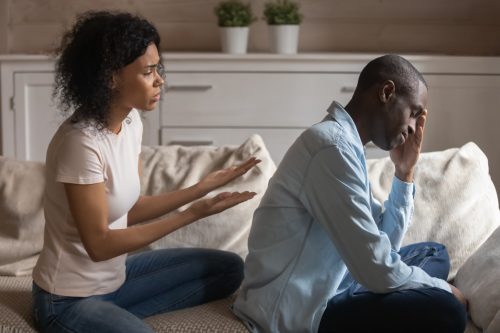Never Say These 5 Words When Apologizing to Your Partner, Experts Warn

Whether you’re saying sorry for missing a friend’s event or for hurting someone’s feelings, apologizing is an art. Depending on the words you use, your tone, and your demeanor, at the end of the day, people can tell whether or not you’re being genuine. That’s especially true when it comes to your significant other—the person that likely knows you better than anyone. So when you make a mistake, it’s important that you acknowledge any wrongdoing in a way that shows you hear your partner and intend to do better moving forward. Read on to learn which five words you should never use when apologizing to your significant other (and how to say sorry the right way).
RELATED: If You and Your Partner Can’t Agree on This, It’s Time to Break Up.
Take the words “I’m sorry you were offended” out of your vocabulary.

When you know you’ve made a mistake, it’s easy to initially feel defensive. But it should never be what fuels your apology. According to Jodi Smith, etiquette expert and founder of Mannersmith Etiquette Consulting, the five words you should never say when apologizing to your partner are, “I’m sorry, you were offended.” Effectively, it translates to a “blame the victim” mentality and the last thing you should want to do is gaslight the person you care about. “It’s just so horrific to do something wrong and then to fail to acknowledge that you’ve hurt or upset somebody,” explains Smith.
Don’t make excuses.

This falls in line with not using those aforementioned five words. Don’t apologize to a significant other using language that cancels out a genuine apology. “Take out the word ‘but,’ as it discredits what was just said previously,” says Myka Meier, Beaumont Etiquette founder and etiquette expert. You’ll want to avoid an apology like “I’m sorry I said that, but you caused me to react like that.” Instead, opt for something like, “I’m sorry I said that. I should not have reacted like that.” That clear message will clean up any kind of mistake or mess.
RELATED: For more etiquette tips delivered straight to your inbox, sign up for our daily newsletter.
Take responsibility for your actions.

When you deflect blame, you’re not being accountable, and are not showing you actually understood that you did something wrong. “It essentially allows the apologizer to blame the apologizee,” says Smith. “There’s no responsibility taken for their actions, and then they don’t work on making it better.” Pointing fingers just isn’t the solution. If you value your partner and your relationship, you’ll swallow your pride and acknowledge when you’re wrong.
Be sincere.

As we said before, it’s easy to tell when someone doesn’t mean what they say. “If you want to apologize well, you need to be sincere,” says Smith. That means owning the hurt you’ve caused, whether it was intentional or not. Furthermore, you need to take the steps to not make the same mistake again. “If my significant other forgets my birthday, and they say ‘I’m sorry, but I was just too busy at work to think about it,’ that’s not a good apology,” adds Smith. However, if they acknowledge their wrongdoing, plan to take you to dinner on a specific night to make it up to you, promise that it won’t happen again, and put a reminder in their calendar, it shows that the person is trying to rectify the situation.
At the end of the day, it’s these small actions done in a thoughtful manner that can make all the difference when it comes to earning the forgiveness of your loved one.
RELATED: This Is the Rudest Thing You Can Ask Someone, Etiquette Experts Say.